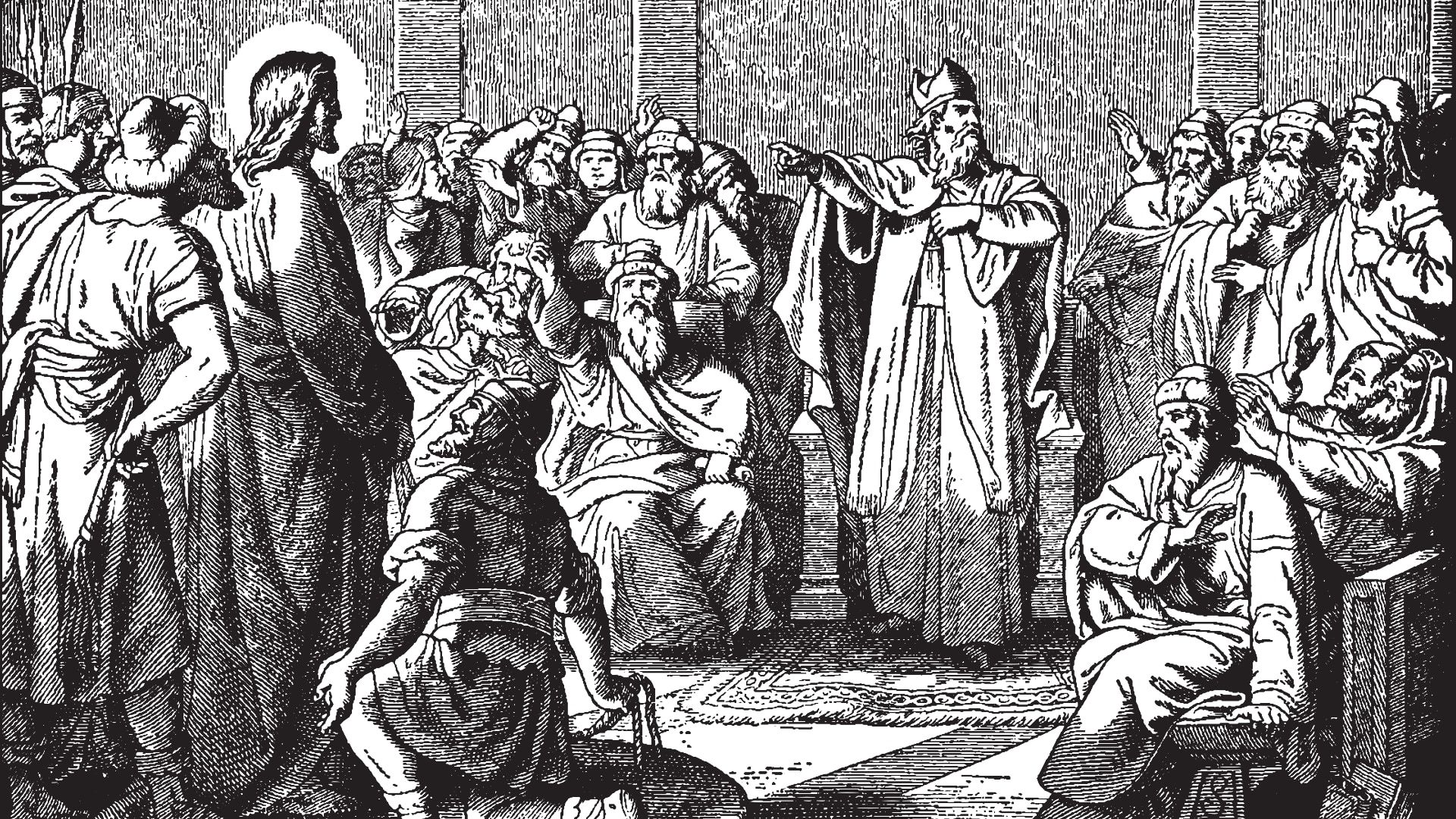Insiders and Outsiders (Mark 3:13-35)

You can say a lot sometimes without coming right out and saying it. In this morning’s passage, the gospel writer presents a series of vignettes. He’s skillful in how he arranges them, and if you look carefully and meditate on them, you begin to realize exactly what he’s saying.
So what’s going on here? Mark presents three stories – about his disciples, the scribes from Jerusalem, and his family. And the picture he creates using these stories is of two groups of people.
- The first group are the insiders: those who are close to Jesus. Mark says in this passage that Jesus is creating a new group of people who may be the most unlikely group of people.
- And then there’s a second group of people: the outsiders. There is another group of people who are opposed to Jesus and his purposes, and it’s not who you would expect.
This passage is all about describing these two groups of people: insiders and outsiders. Mark intends for those of us who read this passage to ask which group we belong to. He wants us to see that those who assume that they are close to Jesus should think again; those who assume that they are far from him should take hope.
So let’s look at this passage, and ask two questions: what’s it like to be an outsider? And what does it take to become an insider, one who is in relationship with Jesus and on track with what he is doing?
Outsiders
The ultimate image of what it means to be an outsider in this passage is found in verse 31: “Then Jesus’ mother and brothers arrived. Standing outside, they sent someone in to call him.”
When you read this verse at first, you may think that Mark is simply describing the physical location of the people in the scene he describes. He is doing that for sure, but he’s doing more. Mark has just told us stories of people who are part of what Jesus is doing, but he’s also told us stories of people who are not getting it. The last story that Mark tells, in verses 31 to 35, tie the stories together, and give us a vivid image of what it looks like to be an outsider: standing outside. The contrast, of course, is found in verses 32 and 34: “A crowd was sitting around him” and “he looked at those seated in a circle around him.”
What is Mark telling us? He’s saying that there are two categories of people, two categories that apply to us today just as much as they did when these events took place. There is no third option. This morning you are either standing outside, or you are inside seated in a circle around Jesus Christ. One or the other.
Even more than that, this image is surprising, because Mark includes Jesus’ own family in the group of outsiders. We see in verse 21 that his family wanted to seize him because they thought that he was out of his mind. They are Jesus' own brothers - the ones who knew him the most. I’ll grant that having Jesus as your older brother would not be the easiest thing in the world. I don’t know how many times they were told as they were asked as they grew up, “Why can’t you be more like Jesus?” It wouldn’t have been easy, but as they saw Jesus grow and as they began to see and hear what Jesus was doing – preaching, healing, casting out demons – I wonder if they recalled stories they may have heard as they were growing up about the birth of Jesus; of their mother being visited by an angel, and of her realization that this was no ordinary child. We don’t know, but we do know that at this point his own family stood outside. Even the holy family – including his brother who would one day be the key leader in the early church – are placed under question.
What this means is that relationship with God is not a matter of genetics. You can be a blood relative of Jesus and still be an outsider. You can grow up amid the trappings of Christianity, grow up in a Christian home, attend church regularly, be baptized, and give sacrificially, and still stand outside. You can think you’re in and still be out. Mark is asking us to consider where we stand, keeping in mind that sometimes those who are close to Jesus should think again, because they in fact are outside even though they think they’re in.
What does it mean to be an outsider? What does it mean to be an outsider? The two groups of outsiders in this passage give us two ways of being outsiders. They’re not exhaustive. There are lots more ways to be outsiders, but Mark highlights two especially that are relevant to us.
The first type of outsider is typified by Jesus’ family. Notice verses 20 and 21, and verse
Then Jesus entered a house, and again a crowd gathered, so that he and his disciples were not even able to eat. When his family heard about this, they went to take charge of him, for they said, “He is out of his mind.”
…Then Jesus’ mother and brothers arrived. Standing outside, they sent someone in to call him.
We don’t know why Jesus’ family sent someone in to call him, but it’s possible that they were still trying to seize him, believing that Jesus had somehow become unhinged.
It’s impossible to know exactly what Jesus’ family was thinking in this passage. We should notice, by the way, how remarkable it is that Mark included this account. Later on, Jesus’ brother James became a key leader in the early church, and wrote the book of James. Jesus’ brother Jude wrote what we have in our Bibles as the second last book in our Bibles, the book of Jude. If Mark was simply making stuff up, he would never have included such incriminating and embarrassing information about the very family of Jesus. He’s clear that Jesus’ very own family, including those who became key leaders in the early church, were at one time completely wrong in their understanding of Jesus no better in a sense than his enemies.
What this tells us is that you can be an outsider if you are sincere but misguided about Jesus’ identity and mission. This is scary, because Jesus’ family were no doubt very sincere and well-meaning in their efforts. They weren’t willfully disobedient. They just didn’t get it. This means that some outsiders are people who in fact are very sincere, who actually like Jesus and want the best for Jesus, but who don’t completely buy in to what he’s doing. Outsiders are sometimes people who like Jesus quite a bit, and are very sincere, but are a little uncomfortable – maybe a lot uncomfortable – with some of what we read in Mark.
On one hand, this makes total sense if Jesus isn’t the Son of God. C.S. Lewis argued this very well. You can’t simply say that Jesus was a good man and a good teacher. Jesus Christ was one of three things; a liar, a mad-man or the son of God. You have to admire that Jesus’ family at least had the courage to face up to the only choices that exist. If you don’t believe that he is the Son of God, then you have to conclude that he’s completely off his rocker, or else a baldfaced liar.
But consider if Jesus is really who he says he is. To sincerely disbelieve would be a tragedy. A recent promotion by H. R. Block offered walk-in customers a chance to win a drawing for a million dollars. Glen and Gloria Sims of Sewell, New Jersey, won the prize, but they refused to believe it when a representative phoned them with the good news.
After several additional contacts by both mail and phone, the Sims still thought it was all just a scam, and usually hung up the phone or trashed the special notices. Weeks later, H. R. Block called one more time to let the Sims know the deadline for accepting the million-dollar prize was nearing and that the story of their refusal to accept the prize would appear on an upcoming NBC “Today Show.” Mr. Sims decided to investigate further. A few days later he appeared on the “Today Show” to tell America that he and his wife had finally gone to H. R. Block to claim the million-dollar prize. His final words were: “From the time this has been going on, H. R. Block explained to us they really wanted a happy ending to all this, and they were ecstatic that we finally accepted the prize.”
The Sims were sincere but misguided, and it almost cost them a million dollars. You can be sincere but misguided about Jesus, and end up an outsider at an even greater cost. Even Jesus’ family was in that position in this passage.
Mark describes another way to be an outsider. You can be an outsider by deliberately scorning the power and forgiveness of God. You see this verses 22 to 30. Jesus has now come to the attention of the religious establishment in Jerusalem. They can’t deny his power. There’s no questioning that he’s performing miracles. There’s only one way to dodge the issue: they attribute his power to Satan. Jesus easily refutes this charge, of course. “How can Satan drive out Satan?” he asks (Mark 3:23). Someone strong has arrived – Jesus – and has bound Satan and is plundering his house. It’s clear that Jesus’ power comes from the Holy Spirit. But the teachers of the law miss it.
This is not a case of sincere but misguided beliefs. This is not a mistake. This is informed and willful rejection. It’s a clear and intentional rejection of Jesus by people who should have known better. It’s a second way to be lost – one that continues to today. Some people are outsiders, even though they know better, simply because they are not ready to yield to what is obviously true about Jesus. They suppress the truth, and they deliberately reject him.
Jesus says that this is a sin that won’t be forgiven. Some people get worried when they read this, because they wonder if they’ve committed the unpardonable sin. The fact that you worry about this is probably a sign that you haven’t. It’s a sign that you probably haven’t deliberately scorned the power and forgiveness of God. What Jesus is talking about here is being so out of touch with God that you attribute his works to that of his archenemy Satan. If you persist in your deliberate rejection of God and his work, you are an outsider, and you won’t be forgiven. Your problem will be the same as the person who goes to the doctor who has medicine that can cure an illness, but that person refuses to take the lifesaving medication and dies.
These are two ways that you could be an outsider. They’re very different at first glance, but in the end they’re not that different at all. Whether you’re sincere but misguided, or willfully scornful, in the end you’re united as outsiders. You’re united in your opposition, even if you are a Bible teacher, or even if you have family connections. Those who think they’re close to Jesus need to be careful, Mark says, because they may in fact be outsiders. Remaining an outsider when Jesus is in the house is a tragedy beyond belief.
Insiders
What, then, does it mean to be an insider? The good news is that the insiders in this passage kind of look like outsiders, which means that you can be an insider even if you don’t feel like it. The image that Mark gives us is a contrast to that of the outsiders. Rather than standing outside, they are sitting around him, seated in a circle. And they’re not the Bible-believing religious crowd or blood relatives of Jesus. Those people are outside. Who is on the inside? The crowds. The rift-raft. Those who assume that they are close to Jesus should think again. Those who assume that they are far from him should take hope. They just may be insiders.
Jesus actually tells us what it means to be an insider. Verses 34 and 35 say:
Then he looked at those seated in a circle around him and said, “Here are my mother and my brothers! Whoever does God’s will is my brother and sister and mother.”
The core family of God, Jesus says, are those who do God’s will. They’re the ones who obediently listen to Jesus and obey him.
Mark gives us another picture of those who are insiders. In verses 13 to 19 Jesus calls twelve out of the crowd to take on a special role. Israel had twelve tribes; this is like the formation of the new people of God.
They have a twofold job description, according to verse 14: “they might be with him.” Secondly, in verses 14 and 15: “that he might send them out to preach and to have authority to drive out demons” – that they may be an extension of Jesus’ ministry. Later on, Luke described people’s reactions after observing some of these apostles: “they were astonished and they took note that these men had been with Jesus” (Acts 4:13).
Being an insider means that we take our place before Jesus; that we commit to doing his will; that we enter into relationship with Jesus, spend time with him, and become extensions of his ministry. Anyone can be an insider who sits at Jesus’ feet and does the will of his Father, and no one can be an insider who does not. And if you’re an insider, Jesus says, you’re closer to Jesus than family. You are his family.
Mark wants us to realize that there is no middle way. He’s either the Son of God who’s bringing God’s Kingdom, or he’s a madman. And based on what you do with Jesus, you’re either standing outside, or you’re inside doing God’s will.
What you need to know is that, at the cross, Jesus became the ultimate outsider so that he could make us insiders. He became rejected by God so that we could be accepted by him. No middle ground. Some that you’d think would be in are actually out. Those who have no in actually are in – not because of who they are, but because Jesus has made them insiders.
I’d like to pray with two groups of people this morning. The first are those who, like the teachers of the law and Jesus’ family, have every reason to think they’re insiders. Some of you know the Bible well. You go to church regularly. You grew up in a Christian family. You are generous with your money. But you’re an outsider because you haven’t dealt with Jesus. Pray that God would reveal to you this morning that you’re an outsider if you really are. It’s far better to know. God prevent us from ever thinking we’re in when we’re not.
I’d like to pray for those here today who know they’re outsiders. Jesus became an outsider, so we could be brought inside. He looks around today and says to the most unlikely people: “Here are my mother and my brothers! Whoever does God’s will is my brother and sister and mother.” You can be part of Jesus’ new and larger family circle because of what he has done to bring you in.
Father, thank you that “now in Christ Jesus you who once were far away have been brought near by the blood of Christ” (Ephesians 2:13). May this be true of everyone here. In Jesus’ name, Amen.





